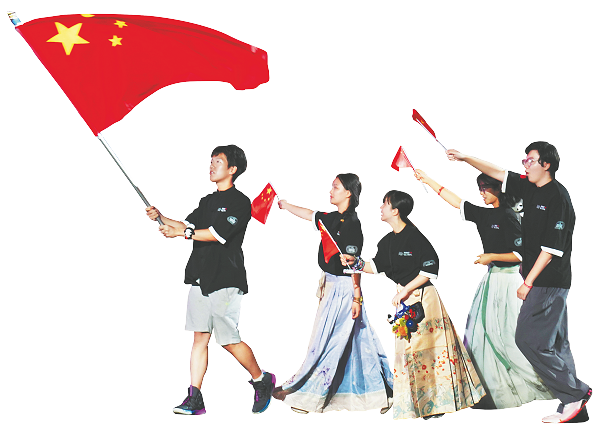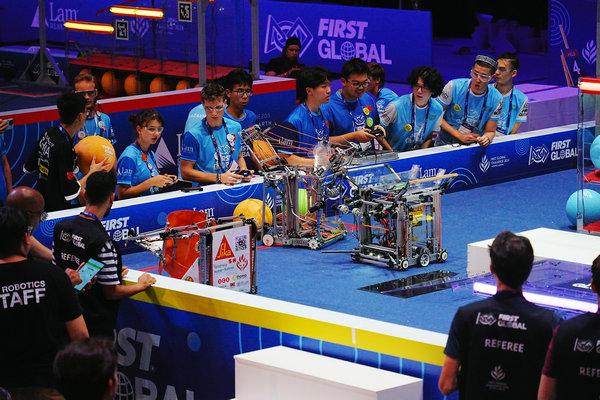
- Home
- Media Center
-
Events
- Wuzhen Summit
- Regional Forums
- Practice Cases of Jointly Building a Community with a Shared Future in Cyberspace
- World Internet Conference Awards for Pioneering Science and Technology
- The Light of Internet Expo
- Straight to Wuzhen Competition
- Global Youth Leadership Program
- WIC Distinguished Contribution Award
- Membership
- Research & Cooperation
- Digital Academy
-
Reports
- Collection of cases on Jointly Building a Community with a Shared Future in Cyberspace
- Collection of Shortlisted Achievements of World Internet Conference Awards for Pioneering Science and Technology
- Reports on Artificial Intelligence
- Reports on Cross—Border E—Commerce
- Reports on Data
- Outcomes of Think Tank Cooperation Program
- Series on Sovereignty in Cyberspace Theory and Practice
- Other Achievements
- About WIC
- 中文 | EN

Robot team leads the way

Members of the team at the competition's opening ceremony in Athens, Greece, on Sept 26. [Photo provided to China Daily]
These moments of teamwork and friendship beyond alliance lines prevailed throughout the competition. Before going to Greece, the team held online meetings with other teams, during which they introduced the Chinese food, art and famous historical sites.

The Chinese team members, all from Beijing's senior middle schools, participate in the event with students from other countries. [Photo provided to China Daily]
"Our team designed badges and stickers with prints of pandas and other well-known animals. Before the competition, we communicated with other teams, and talked about China's landmarks and cultural heritage. The interactions were wonderful," Zhang says. "Every team brought their own personality and warmth. They told me about their cultures, and we exchanged cute accessories. It was memorable."
Chinese team members frequently offered help to other teams in need. Wang Boquan, a 17-year-old from the Beijing No 4 High School, spoke of a touching episode that left him with a deep impression.
"Due to visa issues, most members of Team Afghanistan couldn't make it. Only a 14-year-old girl, her mother and a mentor were able to attend. Since they needed four members — two drivers, a coach and a human player — I didn't hesitate to join as their human player, and modified the controls so that the girl could operate the robot alone," Wang says.
The day before the competition, judges found that Team Afghanistan's robot exceeded the size limit, and disassembled it. Since the girl lacked mechanical knowledge, the Chinese participants helped solve the problem, and reassembled the robot, making sure it could compete.
Throughout the competition, Wang balanced helping the Afghan team with supporting his own. "In the final qualification match, Team China and Team Afghanistan were paired as teammates, with me joining Team Afghanistan. It was an unforgettable experience. I never thought I'd be competing representing two countries," Wang recalls.
The Chinese team's mentor He Xuguo, who has been in charge of FIRST Global Challenge matches in China since 2017, was recognized with an Outstanding Mentor award. He says that he is more like a team member than a supervisor, and stresses the students' independence and innovation.
"At first glance, the robot might seem beyond the capacity of high school students to make, but looking at their notes, you can see how it grew into its final form. Each subsystem went through at least four iterations," he says.
In addition to the fundamental skills of robot design and construction, robotics contests are also a test of teamwork, empathy, creativity and originality.
He says that it is essential to prioritize creativity over rigid instruction. While allowing the students to take ownership of their projects, he offers suggestions, assesses the feasibility of their ideas, and manages the schedule to help them realize their vision.
Outside the competition, the team remains committed to sharing their successful experience and to facilitating robotics activities.
"We open-sourced our robot's code and designs immediately after the competition, in the hopes of helping more teams engage in technological activities," He says.
After returning to China, they have developed plans to help robotics clubs make progress, including creating and publishing tutorials on social media platforms, and reaching out to socially responsible companies to engage in STEM (science, technology, engineering and mathematics) activities.
"Competing alongside teams from over 190 countries and regions allowed the students to see the world's disparities and the different levels of educational resources. Our students come from Beijing's premier schools and have access to exceptional educational opportunities, and this competition has broadened their horizons," He says.
"As beneficiaries of China's initiative of promoting scientific literacy, our students now shoulder part of the responsibility of promoting technology education. We hope their influence will help mobilize more social resources to advance science and technology education across China."

The World Internet Conference (WIC) was established as an international organization on July 12, 2022, headquartered in Beijing, China. It was jointly initiated by Global System for Mobile Communication Association (GSMA), National Computer Network Emergency Response Technical Team/Coordination Center of China (CNCERT), China Internet Network Information Center (CNNIC), Alibaba Group, Tencent, and Zhijiang Lab.





